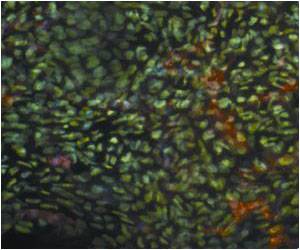Highlights
- Scientists have identified a 3 dimensional culture that can be used to support basic kidney cells called nephron progenitor cells.
- The cells were thrivingly suspended during the early stages of their development.
- These early stage cells can be used to grow a new kidney or for studying the organ.
Nephrons are the functional unit of the kidney and are responsible for filtering the blood and for removing urine.
Studies that were carried out to get progenitor kidney cells used pluripotent stem cells that were used to grow cells that were nephron like progenitor cells. The studies faced drawbacks as the cells take a long time to grow and it was difficult to get a pure isolate of pluripotent stem cells. Moreover, the nephron like progenitor cells usually matured very fast into adult cells and this lead to a lack of progenitor cells that could be isolated or studied.
Nephron Progenitor Cells
In the developing embryo, the cap mesenchyme is the progenitor for all nephron cells, while the stromal mesenchyme gives rise to other kidney cells such as -- Pericytic
- Mesangial
- Interstitial cells
- Rennin producing cells
To sum it all, nephron progenitor cells are present during the developmental stage of a human embryo and then are all converted into mature specialized cells. There are no nephron progenitor cells that are present in the adult kidney, which is why a kidney cannot recover after damage.
Maintaining the Progenitor Cells
The essence of growing progenitor nephron cells was to keep them in this transient progenitor state. The researchers from Salk Institute made the following changes to previous attempts to grow the nephron progenitor cells by- Growing the cells in 3 dimensional culture instead of a flat base culture.
- A mixture of signaling molecules were used to supplement the growth medium.
The Salk University researchers found that
- This method could successfully grow the progenitor nephron cells for more than 15 months.
- These progenitor cells could be made to grow into nephron like structures when they were transplanted into an animal and even in a dish.
- The method used to grow these nephron like progenitor cells can be used to grow other’ lineage progenitors for efficient formation of tissue organoids’, according to Dr. Jun Wu who is the co-author of the study.
The kidney cells can be used to regenerate parts of the kidney that have been damaged. This will aid in controlling the progression of kidney disease and preventing kidney failure.
b. Studying Kidney Diseases
The kidney progenitor cells can be grown in the lab and mutations introduced into the cells to help study various kidney diseases. This will provide a better understanding of the mechanism of the disease, disease progression as well as provide clues to effective treatment methodologies.
c. Growing a New Kidney
The researchers are looking at ways to grow the progenitor cells for the other parts of a kidney, this will aid in growing a kidney in the laboratory that will aid in studying the kidney further as well as for transplantation.
The study on the kidney progenitor cells opens the door way for better treatment and understanding how to reverse kidney damage and restore its function and also grow kidneys in the lab and thus take care of the huge shortage of kidneys in the world. We are now on the brink of a major medical breakthrough.
References:
- New method creates endless supply of kidney precursor cells - (http://www.eurekalert.org/pub_releases/2016-08/si-nmc082416.php)
- Nephron progenitor cells: shifting the balance of self-renewal and differentiation. - (http://www.ncbi.nlm.nih.gov/pubmed/24439811)
















